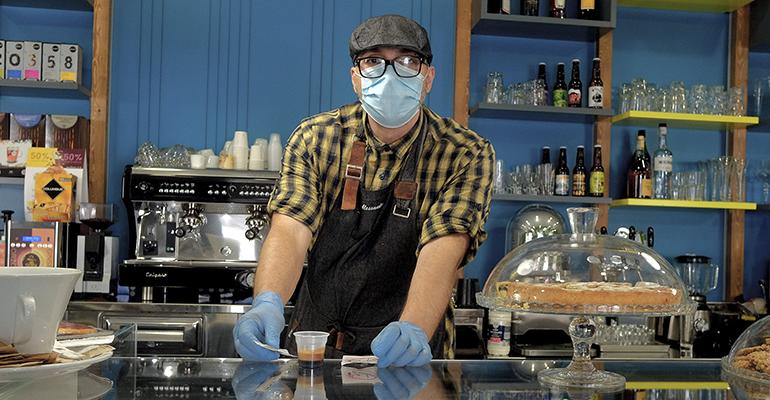The authors of this article are trial attorneys with the law firm King & Spalding. This article does not necessarily reflect the opinions of the editors or management.
As states re-open their economies and federal officials debate protection from coronavirus-related lawsuits for businesses, the restaurateur needs information on what to do now.
The risk of contracting COVID-19 might diminish as the curve bends downward but the risk that remains can create legal liability. Indeed, plaintiffs’ lawyers already have filed lawsuits against companies alleging they were negligent in failing to protect customers from coronavirus.
To limit the likelihood of such lawsuits, restaurant operators should understand those legal risks and consider ways to mitigate them:
Know the rules of your state and local authorities regarding restaurant operations. Most states have issued executive orders that provide specific requirements to be followed to re-open dining rooms. These are the starting point to limit legal liability. Failure to follow these requirements can subject you to civil penalties and fines and may be used to argue that you were automatically negligent in a lawsuit.
State requirements can be found on the governor’s or state health department’s website, and local health departments may also offer guidance. The Texas Department of State Health Services, for example, publishes minimum recommended health protocols for reopening restaurants, and the Georgia Department of Public Health publishes guidance for restaurants with dining room seating.
You should not only adhere to the specific protocols addressing retail establishments but also the protocols required to protect employees. Your customers will interact with your employees and vice-versa, making all protocols important to minimize the risk of transmission. Because these requirements may not specifically address restaurants but more broadly address retail businesses open to the public, you should consider what additional steps specific to your restaurant may be appropriate.
Customize your protocol to address your operation and do not stop at minimum requirements. In addition to state agencies, the Food and Drug Administration, the Centers for Disease Control and Prevention, the Occupational Safety and Health Administration, or OSHA, and other federal agencies offer advice and protocols to restaurants. For example, the FDA has outlined best practices for restaurants on its website.
The elements of effective protocols reported by different health agencies can be divided into four parts:
- Personal hygiene: Regular hand washing for 20 seconds or more using soap and water, avoiding touching eyes, nose and mouth and never handling food and customer-facing eating utensils with bare hands. Servers should use single service gloves or other protective equipment. Other elements of personal hygiene include screening employees and customers for symptoms of COVID-19.
- Cleaning and disinfecting: Use appropriate cleaning and disinfectant products, as well as personal protective equipment, to clean and disinfect high-touch surface areas. This includes counters, tables, chairs, menus, and any items on the tables. Use disposable menus and condiments. The restrooms will require more regular cleaning and disinfecting. Customers should also be offered the opportunity to clean their hands before and after meals. This includes access to restrooms but also can include individual hand wipes and hand sanitizer.
- Social distancing. Current guidelines require six feet of separation. This includes not only lines into and out of the restaurant but also seating areas. Many protocols limit the number of people in the restaurant as well as the number seated at a table. Social distancing of seating at specific tables is neither possible nor practical and those sitting together should be reminded that you cannot control the risks within their group. You can, however, inform customers of other social distancing precautions with signs, floor markings and other visual cues. The use of face masks and face shields are another form of social distancing, as well as non-touch payment methods. Salad bars, buffets or self-service beverage centers should be discontinued.
- Training and Monitoring: No protocol is effective if not followed, so training and monitoring is critical. Even after completing initial training, regular shift meetings should include a reminder of the protocols. Managers should monitor compliance for both employees and customers and adjust emphasis as warranted. A successful protocol requires your team and your customers working together.
Know the risks of legal liability in your state. Developing and implementing a sound protocol will not prevent you from being sued if a customer develops COVID-19.
Every state has its own standard of care that a restaurant owes its customers but most focus on whether the business owner exercised reasonable care to avoid the risk, and whether the customer was aware or on notice of the risk in visiting the property.
A restaurant usually can satisfy its obligation by mitigating the risks through appropriate protocols and by warning of the danger. An adequate warning includes a statement that protocols cannot guarantee the safety of dine-in customers.
Various state agencies contain their own qualifying language that may be adapted. For example, the Texas Department of State Health Services states the following:
“The virus that causes COVID-19 can be spread to others by infected persons who have few or no symptoms. Even if an infected person is only mildly ill, the people they spread it to may become seriously ill or even die, especially if that person is 65 or older with pre-existing health conditions that place them at higher risk. Because of the hidden nature of this threat, everyone should rigorously follow [the protocols being used on the premises, all of which facilitate safe and measured mitigation of the risks]….”
While there is no way to guarantee your restaurant will not be sued over COVID-19, we believe these considerations reduce the possibility of being sued and provide you the best chance of prevailing if a lawsuit is filed.
For our most up-to-date coverage, visit the coronavirus homepage.






